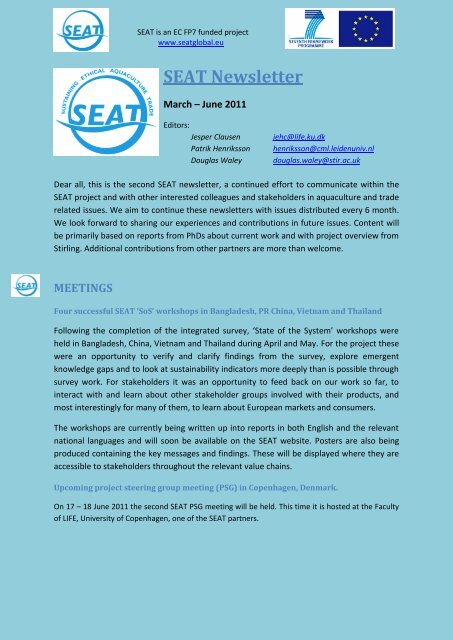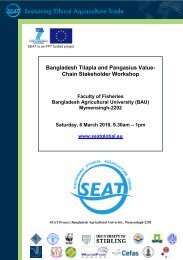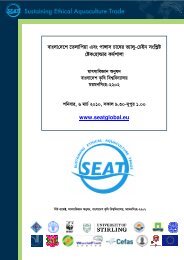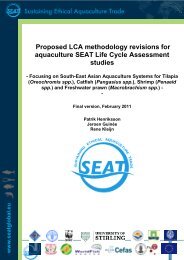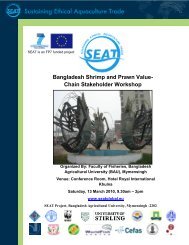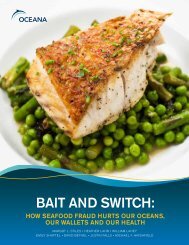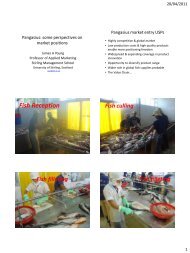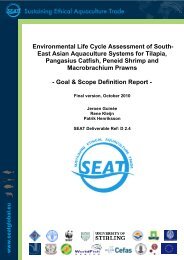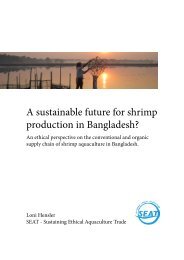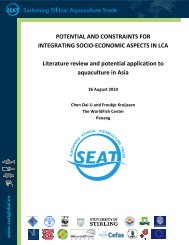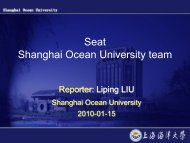Newsletter 2 - SEAT Global
Newsletter 2 - SEAT Global
Newsletter 2 - SEAT Global
You also want an ePaper? Increase the reach of your titles
YUMPU automatically turns print PDFs into web optimized ePapers that Google loves.
<strong>SEAT</strong> is an EC FP7 funded project<br />
www.seatglobal.eu<br />
<strong>SEAT</strong> <strong>Newsletter</strong><br />
March – June 2011<br />
Editors:<br />
Jesper Clausen jehc@life.ku.dk<br />
Patrik Henriksson henriksson@cml.leidenuniv.nl<br />
Douglas Waley douglas.waley@stir.ac.uk<br />
Dear all, this is the second <strong>SEAT</strong> newsletter, a continued effort to communicate within the<br />
<strong>SEAT</strong> project and with other interested colleagues and stakeholders in aquaculture and trade<br />
related issues. We aim to continue these newsletters with issues distributed every 6 month.<br />
We look forward to sharing our experiences and contributions in future issues. Content will<br />
be primarily based on reports from PhDs about current work and with project overview from<br />
Stirling. Additional contributions from other partners are more than welcome.<br />
MEETINGS<br />
Four successful <strong>SEAT</strong> ‘SoS’ workshops in Bangladesh, PR China, Vietnam and Thailand<br />
Following the completion of the integrated survey, ‘State of the System’ workshops were<br />
held in Bangladesh, China, Vietnam and Thailand during April and May. For the project these<br />
were an opportunity to verify and clarify findings from the survey, explore emergent<br />
knowledge gaps and to look at sustainability indicators more deeply than is possible through<br />
survey work. For stakeholders it was an opportunity to feed back on our work so far, to<br />
interact with and learn about other stakeholder groups involved with their products, and<br />
most interestingly for many of them, to learn about European markets and consumers.<br />
The workshops are currently being written up into reports in both English and the relevant<br />
national languages and will soon be available on the <strong>SEAT</strong> website. Posters are also being<br />
produced containing the key messages and findings. These will be displayed where they are<br />
accessible to stakeholders throughout the relevant value chains.<br />
Upcoming project steering group meeting (PSG) in Copenhagen, Denmark.<br />
On 17 – 18 June 2011 the second <strong>SEAT</strong> PSG meeting will be held. This time it is hosted at the Faculty<br />
of LIFE, University of Copenhagen, one of the <strong>SEAT</strong> partners.
VIEWS FROM THE FIELD<br />
<strong>SEAT</strong> is an EC FP7 funded project<br />
www.seatglobal.eu<br />
Life Cycle Assessment - WP3 Leiden University<br />
Mr. Patrik Henriksson from Leiden University just finished a three month field visit to Vietnam and<br />
China to conduct field work in relation to WP 3. We asked him to tell us about his preliminary<br />
findings and experiences during this period.<br />
Patrik Henriksson henriksson@cml.leidenuniv.nl<br />
As the first <strong>SEAT</strong> scoping survey has been<br />
finalized in all four countries and incorporated<br />
into a database covering 1,600 farms in Asia<br />
make bold some of the key points?, the <strong>SEAT</strong><br />
project has entered into its next stage. For<br />
WP3 - Life cycle assessment - this involves<br />
visiting other actors in the value chain,<br />
including processing plants, feed producers,<br />
hatcheries, etc.<br />
Picture: View over one of the reservoirs where tilapia is<br />
farmed in Guangdong, PR China<br />
The fieldwork is undertaken together with WP5 - Social and economic dynamics - where the Life<br />
Cycle Costing (LCC) component has been incorporated into the LCA work. Part of this effort is aimed<br />
at implementing LCC alongside LCA to identify where investments may have the most beneficial<br />
environmental benefits. This in-depth work has been initiated in China together with our partners at<br />
Shanghai Ocean University working on a subset of farms from the initial survey.<br />
Around every tenth visited farms in the scoping survey were CIQ registered (CIQ Registration<br />
Certificate for Animal Products for Export) and therefore are permitted to export their produce.<br />
Guangdong and Hainan province are the major exporting regions and much of the seafood<br />
infrastructure is centered around the city of Zhanjiang. After visiting many key actors in the region it<br />
became clear that EU was not a favored market due to the strict import regulations. Ninety percent<br />
of the export instead went to the U.S. where, on the other hand, prices were undermined by antidumping<br />
taxes. Prices for CIQ registered farms, therefore, are comparable to those of non-registered<br />
farms, with prices in the larger Chinese cities sometimes exceeding those of international markets.<br />
The advantage for CIQ farmers is instead that of having one processing plant that facilitate the whole<br />
harvests. After purchasing the animals the processing plants will quick freeze them whole and<br />
process them after ability. Production is, however, currently limited by the lack of labour as many<br />
workers have moved back to their home-towns inland. While some production industries have<br />
followed these workers inland, aquaculture ventures do not have that option.
<strong>SEAT</strong> is an EC FP7 funded project<br />
www.seatglobal.eu<br />
Donghai Island, Guangdong province, is the<br />
center for much of the shrimp fry production,<br />
shipping as far away as Vietnam. The<br />
broodstock are either domestic, Thai, Malaysian<br />
or Specific Pathogen Free (SPF) from Hawaii,<br />
U.S.A. The sourcing varies upon hatchery and is<br />
determined by species and price. Price differs<br />
greatly, with domestic broodstock costing 25<br />
Yuan per pair while imported SFP come at a<br />
cost of 700 Yuan per pair.<br />
Picture: Patrik and his Chinese colleagues in the field<br />
Despite this is the higher performance and survival of imported broodstock often worth the extra<br />
money as fry only account for around 5% of the total farming costs. Apart from better disease<br />
resistance, genetically improved fry today grow from 2 to 24 grams in as little as 47 days, something<br />
that took 96 days back in 2002.<br />
The tilapia industry, on the other hand, is based around Maoming, Guangdong province, and Hainan<br />
Island. Production is almost always integrated with carp and can be divided into two categories:<br />
integrated and non-integrated farming. The integrated farming systems are usually small to medium<br />
sized and based around the city of Maoming. They utilize manure from on-farm pigs to enhance<br />
primary production in the ponds. While the money returns are said to be better and risks distributed,<br />
integrated farms are not eligible for CIQ certification and therefore very few large-scale integrated<br />
farms exists. Around one third of the 200 farms in the scoping survey applied integrated farming<br />
practices.<br />
Hainan, a large island in Southern China, is the other major region for tilapia production. Aquaculture<br />
has been favored here due to poor agricultural conditions and warm weather, allowing for longer<br />
stocking periods. Several feed producers and processing plants are also located in and around the<br />
city of Haikou. The average farm size is smaller in this region and future production is challenged by<br />
land and water rights. Hainan Island has, over the last decade, developed into a popular tourist resort<br />
which is using up much of these resources.<br />
Another farming system that is facing challenges is tilapia farming in reservoirs. These farms exist in<br />
both Guangdong and Hainan and conduct farming in water bodies often built as water reservoirs for<br />
rice farmers. Opportunistic aquaculturists later moved in and set up fish-farms in these waters. As<br />
more people are competing for the water, however, the water level now often falls below the level<br />
where production can be sustained.<br />
Future work of WP3 will now focus on evaluating the data collected during channel this information<br />
into a full LCA of pangasius farming in Vietnam and tilapia farming in China that hopefully will be<br />
submitted at the end of this year. For more information on the work of WP3 please see our accepted<br />
article - Life cycle assessment of aquaculture systems - a review of methodologies – that most likely<br />
will be published in the Journal of LCA in a near future.
Bangladesh Agricultural University<br />
<strong>SEAT</strong> is an EC FP7 funded project<br />
www.seatglobal.eu<br />
Ahmad- Al- Nahid (Swan) swan_bau@yahoo.com<br />
In March 14 to 26 of this year (2011) I was in Thailand for intensive learning of LCA software analysis.<br />
My friend Patrik was there to make me expert in LCA field. During this time I also visited some farms<br />
in different provinces of Thailand to observe the efficacy of LCA-LCC questionnaire. After return in<br />
Bangladesh I assisted Froujke and Arne for the questionnaire survey in this part. I have been selected<br />
for the ISTA travel award to attend the conference of 9th AFAF in China, but due to a serious road<br />
mishap at 13 April, I missed the program. After one and half month of bed rest, recently I am starting<br />
my work on LCA.<br />
Shanghai Ocean University<br />
Wenbo Zhang wz1@stir.ac.uk or wb-zhang@shou.edu.cn<br />
My research for Ph.D. thesis is a component of the Sustaining Ethical Aquaculture Trade (<strong>SEAT</strong>)<br />
Project supported by the EU Commission, and by contributions from the University of Stirling and the<br />
Shanghai Ocean University.<br />
From January 2010 to September 2010, I was working on the fieldwork for the system scoping of<br />
<strong>SEAT</strong> project, and started writing the first paper after fieldwork finished. The title of paper is<br />
“Development Trends and Sustainability Constraints for Four Export-Orientated Farmed Seafood<br />
Commodities in China”, mainly described the states and trends of the value chain, as well as the<br />
stakeholders perception of sustainability constrains about shrimp and tilapia aquaculture industry in<br />
China. Now the draft of first paper almost finished, but still need to condense further for publishing<br />
in a peer reviewed journal.<br />
From September 2010 to February 2011, the main work for me was conducting and coordinating<br />
integrated shrimp and tilapia farmer survey in Guangdong provinces and Hainan provinces. The<br />
integrated survey is a baseline survey for <strong>SEAT</strong> project to conduct further research, and all work<br />
packages of <strong>SEAT</strong> project were involved in the survey. 207 Tilapia farms and 200 Shrimp farms were<br />
interviewed and surveyed, mainly in Maoming district of Guangdong Province and Wenchang<br />
country in Hainan province for tilapia and Zhanjiang district of Guangdong province for shrimp. Some<br />
part of results will be part of my thesis, such as sustainability indicators. All data input already<br />
finished, but need further check before start analysis. Moreover, the part of the survey results about<br />
sustainability indicators will write to second paper.<br />
As potential major part of my thesis, Life cycle analysis (LCA) is another important part of work for<br />
me. In September 2010, I joined Life cycle analysis (LCA, work package 3 of <strong>SEAT</strong> project) training<br />
program in Thailand, and got primary understanding of theory and practice of LCA. In Mar 2011, the<br />
fieldwork of LCA together with Life Cycle Costing (LCC) was conduct in Guangdong province and<br />
Hainan Province. More than 30 surveys were finished, including surveys with feed mills, processing<br />
plants, farms, hatcheries, etc. More surveys will be conduct in the future to fill all data gaps.<br />
Recently, State of System (SOS) workshop were held in Zhanjiang and I was involved in organization<br />
and reporting research results back to stakeholders, the SOS workshop was successful and we got
<strong>SEAT</strong> is an EC FP7 funded project<br />
www.seatglobal.eu<br />
plenty of feedback and discussion about research results. Photos showing flipcharts and other parts<br />
of the meeting.<br />
Li Kang lk3127@yahoo.com.cn<br />
My research and my PhD will relate to the theme of Food Safety and Public Health which is under<br />
<strong>SEAT</strong> WP6, and my thesis will specific focus on the prevalence and risk factors of fishborne zoonotic<br />
parasites in cultured tilapia in Guangdong Province, .<br />
From October 2010 to December 2010, I have the chance to join the <strong>SEAT</strong> integrated survey in<br />
Guangdong provinces and Hainan provinces. The integrated survey is a baseline survey for <strong>SEAT</strong><br />
project to conduct further research, and all work packages of <strong>SEAT</strong> project were involved in the<br />
survey. In order to complete the large <strong>SEAT</strong> survey, we went to Guangdong and Hainan provinces<br />
again to visit some large farms in February, and we have finished and checked our database with<br />
others when we back to Shanghai.<br />
As potential major part of my thesis, identification and analysing the food-borne parasites is an<br />
important part of work for me. In January 2011, I joined training course in Vietnam, and got primary<br />
understanding of FZT.<br />
In April 2011, Dr. Darwin Murrell of Copenhagen University and I visited a number of tilapia farms in<br />
Guangdong provinces, during the visit we identified many risk-factors for FZT and discussed my<br />
research plan in the future. We also visited the Extension Center’s lab in Maoming and exchanged<br />
information with WP8 and WP3 members during the visit.<br />
In the mid of April 2011, I have attended the 9 th Fisheries conference in Shanghai and joined the <strong>SEAT</strong><br />
meeting during the conference. It was great to meet so many <strong>SEAT</strong> colleagues and to hear about the<br />
different work packages’ status. Darwin Murrell, Jesper Clausen and I also visited the National<br />
Institute of Parasitic Disease (NIPD) which belongs to Chinese Center for Disease Control and<br />
Prevention (CDC). We had a good meeting and established contacts with this parasitic authoritative<br />
organization that will be very valuable for my research.<br />
After the conference, we have held the State of the System (SOS) workshop in Maoming in the end<br />
of April 2011, this workshop included a broad range of local stakeholders on progress of the <strong>SEAT</strong><br />
project. During this SOS workshop, Liping and I have reached a tentative agreement with the<br />
Extension Center in Maoming for the future cooperation.
<strong>SEAT</strong> is an EC FP7 funded project<br />
www.seatglobal.eu<br />
Environmental modelling WP4 Stirling University logo<br />
Lynne Falconer - lynnefalconer@stir.ac.uk or lf23@stir.ac.uk<br />
In October and November I visited Bangladesh, China, Thailand and Vietnam as part of a WP 4<br />
scoping trip to gain information on the areas, species and systems that are part of the <strong>SEAT</strong> project in<br />
each country. I also helped to pilot the farmer survey in each country and had the great opportunity<br />
to meet some of the people involved in the <strong>SEAT</strong> project from both Asia and Europe.<br />
The information obtained from the scoping trip, along with information from the farmer surveys,<br />
allowed me to determine study areas. Following on from this I have started to construct databases<br />
for each country using information gathered from many resources (satellite imagery, maps,<br />
spreadsheets etc)and GIS software for analysis (IDRISI Taiga and Manifold 8). This data will be used<br />
to develop the spatial environmental models for WP 4.<br />
Lynn Munro lim2@stir.ac.uk<br />
In September 2010 I participated in the Survey workshop in Pattaya, Thailand. Through October and<br />
part of November I assisted one of the <strong>SEAT</strong> coordinators in piloting the Farmer Survey in each of the<br />
partner countries (Vietnam, Bangladesh, China and Thailand). Since then I have been working on<br />
some basic models.<br />
In April I participated in a group talk to a Member of the European Parliament regarding water<br />
quality in pangasius farming in Vietnam. I will be travelling to Bergen, Norway to participate in a<br />
training course for the dynamic modelling programme, “Powersim”. Following this I will also be<br />
participating in the Sampling Workshop to be held in July in Thailand.<br />
At present I am sorting the databases for data useful to WP4 and updating them as new databases<br />
are uploaded.
<strong>SEAT</strong> is an EC FP7 funded project<br />
www.seatglobal.eu<br />
Social and Economic dynamics - WP5 WorldFish Centre<br />
Ingrid Kelling i.kelling@cgiar.org<br />
I have just completed three months of fieldwork in Thailand, conducting a value chain analysis of the<br />
shrimp and tilapia chains from the point of<br />
production to export. The next few weeks<br />
will be spent writing the field report and<br />
synthesizing outputs from the fieldwork in<br />
Bangladesh and Thailand. An abstract by<br />
Froukje, Jimmy and I titled, Consumer<br />
interest in sustainable value chains of<br />
farmed fish: a comparative case study of<br />
shrimp chains from Bangladesh and<br />
Thailand¹ has been accepted at the IFAMA<br />
Conference in June 2011, and this paper is<br />
currently being drafted.<br />
Picture: Ingrid with farmers in Thailand<br />
The summer will be spent writing PhD chapters and preparing for the European fieldwork, which will<br />
follow the chains from import in the EU to final consumers in the major markets. This will take place<br />
between September and November, 2011.<br />
Food Safety and Public Health - WP6 University of Copenhagen logo<br />
Jesper Hedegaard Clausen jehc@life.ku.dk<br />
The large <strong>SEAT</strong> interview survey has been<br />
completed and from a food safety point of<br />
view, it looks good! Good in terms of the<br />
producers of aquaculture products in the four<br />
Asian <strong>SEAT</strong> countries are well aware of food<br />
safety issues in the production of the products.<br />
I think the European consumer should be<br />
informed about the effort the Asian farmers<br />
put into producing food that is safe and healthy<br />
for them. That is all part of <strong>SEAT</strong>.<br />
P<br />
Picture: The <strong>SEAT</strong> team in action in Thailand<br />
My research is progressing well. Based on the <strong>SEAT</strong> survey WP6 have chosen two case studies to<br />
work on in Thailand. We will work together with the Thai <strong>SEAT</strong> team and two Msc students doing<br />
research on fishborne zoonotic parasites (FZT) in tilapia and on probiotics for tilapia production. I<br />
look forward to this corporation and I am sure we will soon have many interesting results to share.<br />
In PR China we will together with Shanghai Ocean University work together with Mr. Li Kang, the new<br />
PhD student.<br />
I attended two meetings together with <strong>SEAT</strong> over the last few months. I attended the 9 th AFFA in<br />
Shanghai Ocean University in April 2011 together with <strong>SEAT</strong> and ASEM colleagues. This was a good
<strong>SEAT</strong> is an EC FP7 funded project<br />
www.seatglobal.eu<br />
opportunity to share information and learn new things about aquaculture and food safety in the<br />
sector. I was also at Can Tho University to attend the SOS, Vietnam workshop together with<br />
colleagues from Stirling and Bergen University. It was a good experience with many stakeholders<br />
present in the same room, so plenty of discussions and good exchange of information.<br />
Contamination Issues - WP7 Wageningen University logo<br />
Andreu Rico andreu.rico@wur.nl<br />
During the last few months I have been developing a new modeling tool for assessing environmental<br />
risks of veterinary medicines applied in Asian aquaculture ponds, which has been called ERA-AQUA<br />
Decision Support System. This model is able to combine information on physico-chemical<br />
characteristics of veterinary drugs, environmental data and aquaculture management practices, in<br />
order to assess risks for the cultured species, consumers and aquatic ecosystems receiving effluents<br />
from aquaculture ponds. This model will be used for performing a preliminary risk assessment of<br />
aquaculture chemicals based on the data gathered during the <strong>SEAT</strong> baseline survey and to identify<br />
compounds and ecosystem components that require further in-depth studies. The model was<br />
recently presented in a platform presentation during the 9 th Asian Fisheries and Aquaculture Forum,<br />
Shanghai, China. In addition, we have started a study in the Tha Chin River (Suphanburi, Thailand) in<br />
which we will be looking at chemical use in tilapia cages and impacts on tropical freshwater<br />
ecosystems. This study is being carried out with the collaboration of Jidapa Khatikarn (Kasetsart<br />
University) and Frederieke Knopperts (Free University of Amsterdam / Wageningen University) and<br />
will be considered as a start for developing further monitoring studies in different <strong>SEAT</strong> countries and<br />
aquaculture production systems. During the next three months I will be based in Bangkok and will be<br />
involved in the organization of the Monitoring Workshop, which will be held in KU Home, Kasetsart<br />
University Campus, during 4-6 th of July. During the monitoring workshop experts from Stirling<br />
University (WP4), University of Copenhagen (WP6), Wageningen University (WP7), Kasetsart<br />
University, Can Tho University, Bangladesh Agricultural University and Shanghai Ocean University will<br />
meet in order to discuss the project progress and design a protocol for the up-coming chemical and<br />
biological monitoring activities, which will be aimed at i) assessing effects of contamination at the<br />
farm level for different endpoints (i.e., aquatic ecosystems, targeted produce, consumers), ii) testing<br />
the environmental models developed within the <strong>SEAT</strong> project, and iii) identifying action research<br />
needs based on the outcome of the monitoring program (e.g. identification of ecotoxicological<br />
research needs and risk mitigation measures).<br />
Action Research - WP9 University of Stirling<br />
It is a key objective for the <strong>SEAT</strong> project that, through engagement with MSMEs, our research results<br />
in an increase in overall value and sustainability of food production systems. In work package 9 <strong>SEAT</strong><br />
will use its research findings alongside the experiences of MSMEs to plan and implement a phase of<br />
action research aimed at development of simple measures for reducing environmental, social or<br />
health impacts such as improving product efficiency, reducing packaging and the application of<br />
diagnostic tools for contaminants.<br />
Our work is focused on MSMEs both in Europe and Asia. With their respective comparative<br />
advantages, the European participants will mainly be technical service providers in fields such as<br />
traceability, environmental services and communications and market information technology
<strong>SEAT</strong> is an EC FP7 funded project<br />
www.seatglobal.eu<br />
systems. Asian participants will largely by small and medium producers, processors of fish and coproducts<br />
as well as service providers and regulators both upstream and downstream of production.<br />
The scope of MSMEs we can engage with is not limited.<br />
Our main research findings will indicate clear directions where action research can be of most value,<br />
although we can pursue opportunities in any direction. Currently experimental grow bags filled with<br />
pangasius waste are growing vegetables in Bangladesh, we are establishing links between European<br />
businesses and aquaculture trade press in Asia, and we are working towards producing informative<br />
videos and literature aimed at communicating the reality of Asian aquaculture to the European<br />
consumer.<br />
Please find a file box and matrix on the extranet where all are encouraged to put ideas for possible<br />
action research.<br />
NEW RECRUITS<br />
Karen Sau Jespersen ksa@diis.dk<br />
I joined the Danish Institute for International Studies (DIIS) as a PhD<br />
Candidate in February 2011 where I will provide input into <strong>SEAT</strong> WP5 on social<br />
and economic dynamics of value chains for selected aquatic products<br />
in Vietnam and China. I am affiliated to the DIIS research unit ‘<strong>Global</strong> Economy,<br />
Regulation and Development’ and the Graduate School of International<br />
Development Studies at the Institute of Society and <strong>Global</strong>isation, Roskilde<br />
University (RUC). During the past two months I have settled into the project and<br />
provided input into <strong>SEAT</strong> deliverable (D8.4) on aquaculture certification<br />
schemes. I the coming months I will spend time preparing for fieldwork<br />
scheduled for July 2011 to January 2012 (3 months each in Vietnam and China). I hold a MSc in Socio-<br />
Economic Geography from University of Copenhagen and have previous experience with green<br />
procurement policy from the public sector and environmental management & occupational health<br />
and safety from the private sector.<br />
Tran Minh Phu tmphu@ctu.edu.vn<br />
Tran Minh Phu has BSc in Aquaculture from Can Tho University and MSc<br />
in Sustainable Coastal Development, Aquaculture from the Norwegian<br />
University of Science and Technology. He has experience on Pangasius<br />
catfish farming both in nutrition and chemical contaminations.<br />
From 2004, Phu worked in Can Tho University as a researcher with several<br />
projects funded by the Australian Center for International Agriculture<br />
Research, ACIAR Belgium, Vietnamese Government and SFP. Mr. Phu will<br />
from July 2011 start his Phd under <strong>SEAT</strong> with the University of<br />
Copenhagen, Denmark.
OTHER <strong>SEAT</strong> NEWS<br />
<strong>SEAT</strong> is an EC FP7 funded project<br />
www.seatglobal.eu<br />
Influencing policy through MEP, Struan Stevenson<br />
Following his strong criticism of pangasius in the European Parliament <strong>SEAT</strong> invited Senior Vice<br />
President of the European Parliament’s Fisheries Committee Struan Stevenson to Stirling for a<br />
briefing on the reality of pangasius production and trade, and our experiences in Vietnam. Staff and<br />
PhDs from the <strong>SEAT</strong> project, with other colleagues from the Institute, gave presentations to Struan<br />
(full details on <strong>SEAT</strong> website) covering every aspect of the pangasius value chain. Struan went on to<br />
visit the Mekong Delta for himself following which he made extremely positive statements about<br />
pangasius production and trade, and credited <strong>SEAT</strong> and VASEP with setting him straight.


